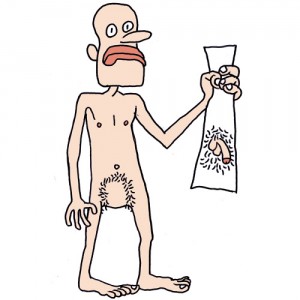Slubberdegullion

Slubberdegullions are primarily nocturnal creatures, found in the vicinity of bars and watering holes. They emit a palpable sense of danger, often smell like cigarettes and cumin and their ham-fists clench and unclench in incessant impotent fury. At closing time they stumble out into the street to threaten each other.
A Slubberdegullion is a filthy, slobbering, slovenly villain; a worthless alcoholic ne’er do well; a knave, a louse. Etymology: from English Slobber, + unknown suffix, but there are some theories on its provenance here.








